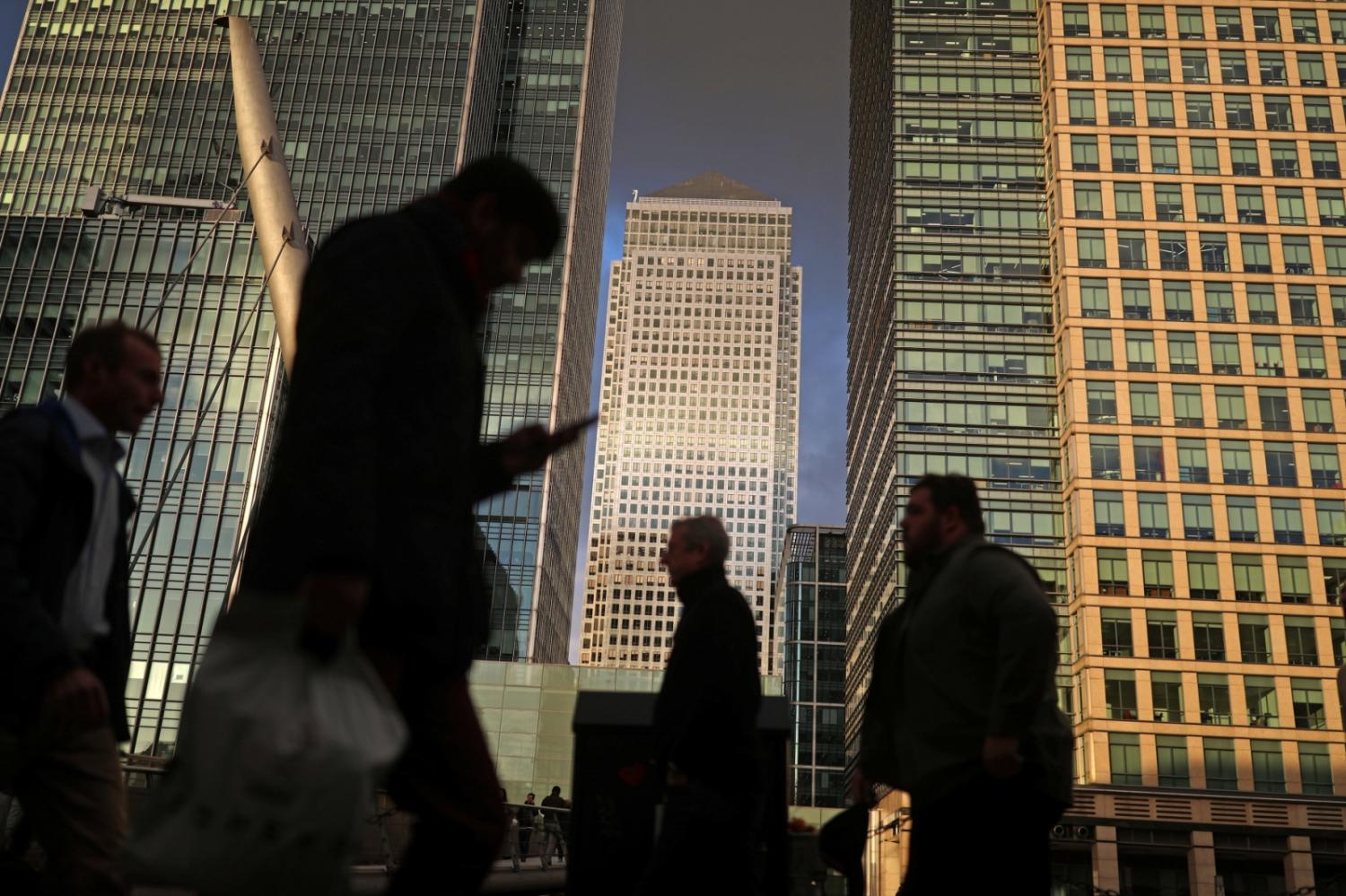Fabio Castaldi is surprisingly hard to find in London for a man who has registered hundreds of companies there.
He supposedly runs a tax consultancy out of a co-working space in Moorgate, in the city’s central business district, but nobody there had ever heard of him. Nor did his name ring a bell for a receptionist in an imposing Edwardian building overlooking the oldest public park in London, previously listed as his firm’s headquarters.
Where Castaldi does keep popping up is in the case files of Italian financial police who investigate money laundering and other illicit financial flows between Italy and the UK. They say he has a track record of creating companies used for criminal activities. (Castaldi himself denies any criminal involvement, and says he cannot be held responsible for what his clients do with the firms he helps them create.)
Experts say his years-long career as a professional formation agent sheds light on how London has become a haven for money laundering by organized criminal groups, in part because it is so easy to create companies in the UK.
The Problem With UK Formation Agents
A formation agent registers companies on behalf of another party, and often helps manage them. In December, OCCRP revealed some of the secrets behind the doors of one of London’s most notorious such firms, Formations House.
The 54-year-old Italian, a self-described accountant and expert in international law and taxation, set up a UK-based consultancy, Castaldilawyer & Partners, in 2008. (He is not a lawyer in either Italy or the UK.)
Since then, Castaldi and his company — which he later renamed “Castaldi Lawyer” — have appeared in at least four separate Italian police investigations into tax evasion, bankruptcy fraud, and money laundering. In one case he is about to go on trial, while in another, he is under investigation pending the issuing of an indictment. In two others, Castaldi’s firm is named as a “service provider” for the criminals.
Castaldi’s clients include a luxury ceramic-tile retailer now on trial for laundering mafia money, a rising young politician arrested for embezzlement, and a group of businessmen from Italy’s wealthy northeast accused of massive tax fraud.
In one case, in the northeast city of Vicenza, he was indicted for what Fiscal Police said was his “central role” in an elaborate scheme to cheat tax authorities out of 130 million euros in value-added tax (VAT). Castaldi was accused of transforming Italian companies used in the alleged fraud into British companies he controlled, thus obstructing investigations. He was even arrested on these charges in Rome in 2016, but was released shortly afterwards as the investigation continued. (It is still pending.) Castaldi told OCCRP he was innocent of these allegations.
Castaldi also played a prominent role in a multi-million-dollar fraud police uncovered in Catania, Sicily, a year ago, according to court records. He was accused of conspiring with an Italian lawyer in a series of bankruptcy frauds between 2013 and 2015.
Together, the two men allegedly helped indebted businessmen dodge taxes and creditors by stripping companies of assets and transferring them to newly created firms in the UK or Croatia, making it difficult for creditors to exact their due.
Investigators accused Castaldi and alleged co-conspirators of other crimes in the Catania case, too, including tax evasion, misappropriation of funds, and destruction of financial records. In total, authorities estimate the case involved at least 10 million euros in illicit profits. Castaldi was charged with several counts of bankruptcy fraud and money laundering and is currently being tried in Catania. He told OCCRP he was innocent of these charges as well.
In two other cases, Castaldi is not accused of direct involvement in wrongdoing, but his firm is named as a “service provider” in connection with alleged crimes.
In one of these, Antonio Scimone, a 43-year-old Italian businessman, is charged with using Castaldi’s services to set up and manage multiple UK-registered companies that moved money belonging to the ’Ndrangheta mafia out of the EU. He is also accused of using the same companies in a complex scheme known as a carousel fraud, to avoid paying taxes on the money as it moved around Europe.
Scimone told OCCRP that all the allegations were false. “I reject any accusation of contact with the ’Ndrangheta,” he said. “Unfortunately, there is prejudice because I am an entrepreneur from Calabria, and Calabria equals ’Ndrangheta.”
He threatened to sue if journalists wrote about the accusations that he had moved mafia money through the UK.
“We moved to London those Italian companies that had a tax debt, but there isn’t anything illegal about it. In the ongoing judicial proceeding, we are charged with transferring money abroad without real movement of goods. Our defense is that we have really moved goods, and I can prove it.”
Authorities see things differently. A semi-annual report from the Italian Antimafia Investigations Directorate, published in July 2019, highlighted the Scimone case as an example of how the UK has become a problem jurisdiction for Italian investigators trying to track the movement of criminal money across borders.
The ease of company formation in the UK allows “immediate operativity of a corporation (Ltd.) or trusts, entities that are sometimes also used by criminal organizations,” the report said.
The investigation “made it possible to dismantle an ’Ndrangheta group which, by using a qualified professional, was engaged in money laundering and re-use of criminal money in the United Kingdom,” the report continued.
Castaldi first came to the attention of Italian authorities in 2013. A clerk at the country’s consulate in London became suspicious of a series of residence registration requests that all listed a single address, a house in the suburb of Cricklewood, according to the Italian Financial Police liaison officer then posted in London. (Italians living abroad are required to register with their local consulate.)
These requests were submitted by Castaldi Lawyer, which itself raised suspicion, the officer said, because actual lawyers seldom file such papers. More importantly, two of the residency applications were for men on an Italian police watch list for suspected dealings with the ’Ndrangheta.
One of them is Alberto Pizzichemi, whom the prosecutor’s office in Bologna considers linked to the Iamonte clan of the ’Ndrangheta. Pizzichemi was arrested in 2018 and charged with holding assets for the mafia as a proxy.
Castaldi’s business website, which is no longer online, long offered clients the ability to form companies, register corporate directors, and even — it claimed — obtain diplomatic passports.
In an interview, Castaldi defended the applications, saying it was perfectly legal for his firm to help Italian clients with UK residency paperwork, and that he could not do extensive research into the background of every client. (There is no evidence that Castaldi knew of his clients’ criminal backgrounds or any criminal intent on their parts.)
Castaldi’s main business, however, appears to be the creation of companies, the service Scimone used. Since 2008, Castaldi Lawyer has registered hundreds of them.
Among the directors or shareholders of these firms are three men with alleged links to the mafia, two entrepreneurs accused of tax fraud, and an Italian politician arrested for embezzlement, according to an OCCRP analysis of police records and the UK business registrar.
Castaldi says his firm attracted so many clients simply due to the advantages of the UK regulatory environment. “Registering a company costs just 25 euros, and a simple form of management costs only 800 euros per year,” he said.
He insisted that his involvement with his clients was limited and that the services he provided were benign and barely rose to the level of management.
“Of course,” he added, “the mortality of these companies is very high.”
But for investigators, the systematic creation of companies destined to "die,” apparently without doing any business, is a warning sign of financial fraud.
Carousel fraud, in particular, relies on disposable companies in order to function, since it works by creating fictitious intermediaries between buyers and sellers (see box).
The Money-Go-Round
A carousel fraud is a scheme in which real or fictitious goods are bought and sold through a series of companies in different countries. The VAT taxes due on the transactions are assigned to an intermediary company which then goes out of business or moves offshore, taking the tax debt with it.
Italian investigators accuse Scimone of making the VAT-evasion “carousel” available to ’Ndrangheta affiliates to launder dirty cash through fake invoices. He has been charged with one count of aiding a mafia-type association, with prosecutors alleging he “helped the economic interests of the ’Ndrangheta ... by guaranteeing the laundering of profits originating from criminal activities.”
After the bogus Italian companies that formed the carousel had run their course, they needed to be moved out of the way since they would have a huge VAT debt if they were ever investigated. Often, fraudsters just allow such companies to become inactive, but it is safer to move them abroad to “die.” This is where Castaldi came in.
Castaldi Lawyer managed at least two of the six British companies Scimone controlled in London, to which he transferred the assets of the debt-laden Italian companies. By doing so, he was able to move the capital into the UK, where authorities have a poor track record of cooperating with Italian police on such matters. According to the Italian Fiscal Police, the British companies held their bank accounts in Switzerland, which made it impossible to trace all the money.
None of the Castaldi Lawyer staff members were charged in the case, and Castaldi told OCCRP he was not aware of Scimone’s trouble with the law. He said he did not open any bank accounts for Scimone’s companies. Scimone also denied that Castaldi had ever opened accounts for him.
“I’ve never met Castaldi; I’ve never been to his office,” he said. “We asked for quotes on business services remotely, and we eventually chose his firm.”
British authorities, for their part, have done little to help the Italians investigate. The Florence office of Italy’s Fiscal Police sent two requests for assistance to its UK counterparts, according to a source close to the investigation, who asked not to be identified as he was not authorized to discuss the case with the media.
The first went unanswered. The second, a request to seize the companies in order to obtain the numbers of their Swiss bank accounts, was denied, with British authorities explaining that there was nothing to seize since the corporations were already closed and emptied.
Ella Cahoon, a spokesperson for the City of London Police, did not respond to emailed questions about the alleged lack of cooperation, saying only, “We have never arrested anyone by the name of Fabio Castaldi.”
Anna Sergi, a scholar of criminology and sociology at the University of Essex, told OCCRP that although the UK has strong anti-money laundering legislation, police can only investigate when the money stems from underlying criminal activity — for example, drug trafficking or extortion. Mafia association alone is not a crime in the UK.
Because of this, the British legal system is not well-equipped to target accountants, lawyers, and other service providers accused of working with Italian mafia groups, Sergi said.
“The legislation on money laundering is very good, but the need for an underlying criminal activity to trigger a money-laundering investigation hinders investigations in the UK, and this is obviously exploited by the Italian mafias,” she said.
“These accountants are particularly problematic [because] the UK law enforcement fails to follow the money,” Sergi added. “In Italy, we follow the money. ... In the UK you don’t follow the money, you follow the people, and if the people are not clearly linked with the criminal origin of the funds, there is not much police can do.”
In London today, Castaldi cuts an almost ghostly figure. His firm has had six separate addresses in the British capital since it opened. Castaldi Lawyer is now formally registered at the co-working space in Moorgate, but an OCCRP reporter who sought him there was met by a receptionist who said, “There’s nobody by that name here.”
Asked whether Castaldi Lawyer was still operating, Castaldi was vague, saying only, “I no longer practice the profession of a fiduciary.”
He told OCCRP he had become frustrated by how easy it was for responsible professionals like himself to be confused with unscrupulous corporate proxies.
IRPI received a grant from Journalismfund.eu to support its reporting on this issue.







